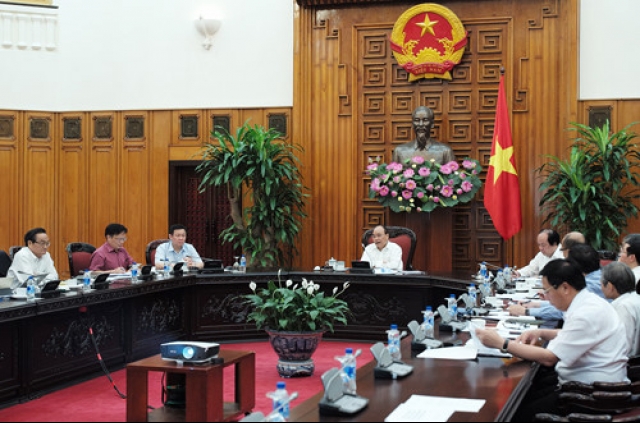Neither increased investment in the State-owned sector nor the extraction of resources will be the country’s growth engine during the years to come, the first working session between Prime Minister Nguyen Xuan Phuc and the newly-formed economic advisory board heard on July 29.

Progress in reforming the economy has been a race against time. Without an effective solution to actualize the government’s command and create motion within the entire bureaucracy, the primary economic targets of National Congress XII of the Communist Party of Vietnam will not be accomplished, Mr. Vu Viet Ngoan, Head of the board after leaving his post as Chairman of the National Financial Supervisory Commission, told the session.
Other than long-term policies, the policy system in the short- and mid-terms need to touch on two basic matters, with the first purpose of policies being to untie difficulties, reducing fees for businesses and enhancing the effectiveness of the State economic sector. In the midst of that, drastically reforming the organization and implementation stages of the government’s directives are the decisive factor.
Second to that is the renovation of the current operating structure. The bureaucracy, while being “pulled” by the Prime Minister, needs to be “boosted for efficiency” by the public and society.
Associate Professor Dr. Tran Ngoc Anh from the US’s Indiana University suggested there be a monitoring system to assess the implementation of policies and government directives by ministries, authorities, and provinces.
Director of Research at the Fulbright Economics Teaching Program, Dr. Vu Thanh Tu Anh, meanwhile, believes that all the macroeconomic balances, including saving-investment, the balance of payments, and budget and fiscal balances, have already approached limits. In order to develop, there needs to be a reform of the economy, with the most important factor being labor productivity.
In conclusion, the advisory board suggested that for Vietnam’s economy to return to the 7 per cent growth cycle, solutions need to focus on enhancing the effectiveness of investment, quickly boosting labor productivity while improving inputs to raise potential outputs.
Acknowledging the solutions, PM Phuc stressed that problems such as public debt and job creation cannot be resolved without economic growth. He agreed that institutional barriers need to be removed to create a better investment environment, improving competitiveness, and facilitating all conditions for business development.
According to PM Phuc’s decision, his new advisors can suggest amendments to current policies and regulations, especially in times of volatility, both in domestic and global markets.
Among the 15 members are respected Vietnamese economists, including those working and teaching in France, Japan, Singapore, and the US.
Vietnam aims to expand its economy by 6.7 per cent this year, a target now considered ambitious by many experts after a relatively sluggish first half. The IMF and HSBC this month both revised their growth forecasts down, to 6.3 per cent and 6 per cent, respectively.
VN Economic Times